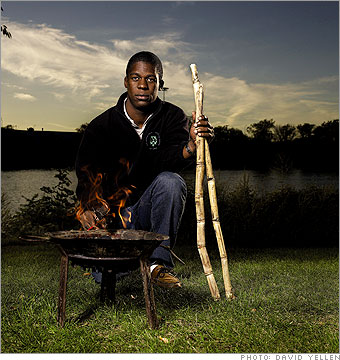Cooking fuel doesn't seem like much to ask for, but an estimated 2.4 billion people worldwide struggle to find it. Consider Haiti, where 700 tons of wood is burned annually, and smoke from thousands of charcoal fires has led to widespread respiratory infections. "Propane is not accessible, and electricity is not affordable," says Haitian native Jules Walter. "These people do not have any alternative."
That's why Walter has started a company called Bagazo to sell low-cost charcoal briquettes made from plant waste to his countrymen. Bagazo is Spanish for "bagasse," or sugar cane waste, but corn cobs and banana leaves can also be used in Walter's process.
The waste material is carbonized, mixed with a binder, pressed into briquettes, and allowed to dry. The result burns far cleaner and longer than wood.
It costs $3 to make a 44-pound bag of Bagazo briquettes, $2 cheaper than the production cost of regular charcoal. Walter will sell the bags for $5 each - just as soon as he graduates from MIT in 2008.
Bagazo is locking in partnerships with local sugar cane suppliers and encouraging them to buy shares in the company. Since electricity is pricey, his team is considering using solar technology to power the carbonization machines.
Walter thinks he's looking at a $125-million-a-year market in Haiti alone, but he is aiming for a more modest $3.1 million in annual revenue by 2012. If all goes well in Haiti, Bagazo will replicate the concept in other developing countries, such as Kenya and Tanzania. "We want to inspire entrepreneurs," Walter says. "It is possible to do good and make money. You need to believe in how your company can impact the world."
 Jules Walter makes his charcoal from sugar cane waste. It burns cleaner than rival products.
A greener charcoal
| Behind the scenes at the Boston launch of Virgin Money, Richard Branson's new peer-to-peer lending service. (more) |
